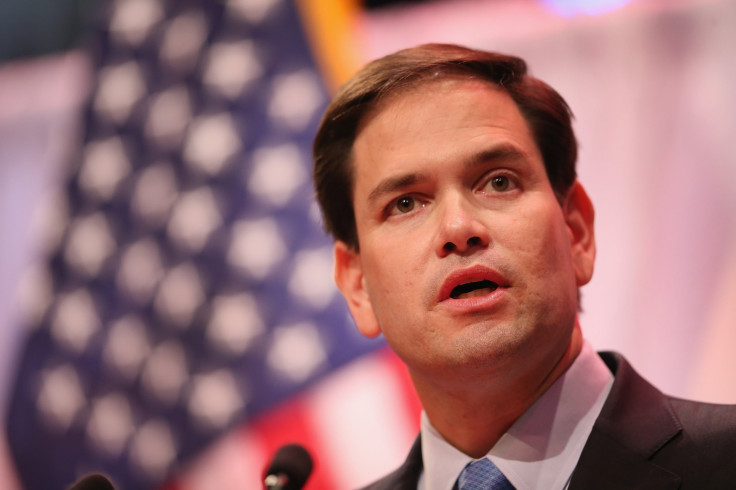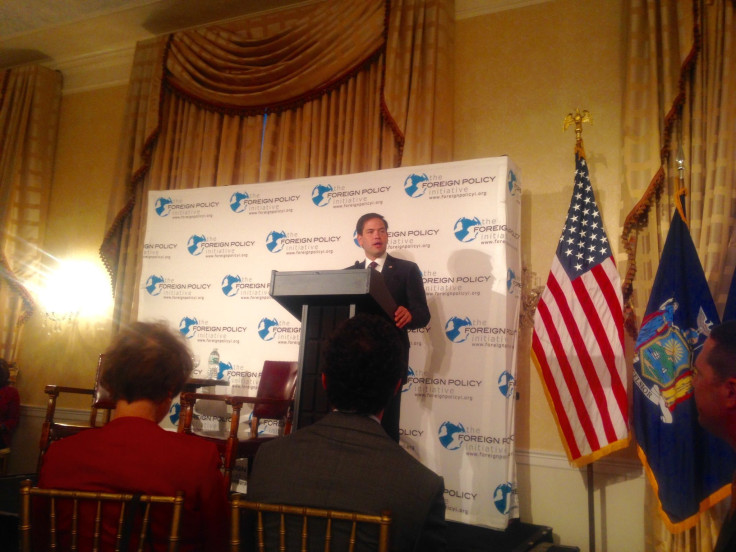Election 2016: Rubio Condemns Iran Nuclear Deal, Cuba Relations In US Foreign Policy Speech

NEW YORK -- U.S. Sen. Marco Rubio, R-Fla., condemned the Obama administration's actions in Iran and Cuba in a speech Friday laying out his foreign policy ideas. The presidential hopeful strategically timed his address to be delivered just before Secretary of State John Kerry's diplomatic mission in Havana, where the U.S. reopened its embassy after more than 50 years.
Rubio has tried to set himself apart from an overcrowded GOP race in the past few weeks without much success. Once seen as a top-tier candidate, he has been overshadowed by the antics of business mogul Donald Trump, and his performance at last week's first Republican debate did little to break him out from the middle of the herd. His foreign policy platform, as detailed Friday in his speech hosted by the Foreign Policy Initiative, was similar to those of many of his fellow Republican candidates: condemning the Iran nuclear deal and championing interventionism abroad. But the Cuban-American Rubio looked to make a name for himself with his policy on Cuba, speaking passionately on the balance between dialogue and domestic security.
"The concessions to Iran and Cuba both endanger our nation,” Rubio declared Friday, before adding, “The deal with Cuba threatens America’s moral standing in our hemisphere and around the world.”
During his first election to the Senate, Rubio claimed that his parents fled Fidel Castro’s communist regime and took refuge in the U.S. before he was born. However, it was discovered during the campaign that his parents had left a few years earlier, during Fulgencio Batista's presidency.
Rubio spoke Friday of his support for Cuban dissidents who oppose the current Raul Castro government and condemned the Obama administration’s alleged lack of support for them, calling Kerry’s visit to the embassy “a propaganda rally.”
“I will invite Cuban dissidents, Iranian dissidents, Chinese dissidents and freedom fighters from around the world to be honored guests at my inauguration,” said Rubio, stating his strong support for those who oppose oppressive governments.
If elected, Rubio said, his three-part plan for Cuba would be both militarily offensive and economically crippling. A Rubio foreign policy would include forcing the Castro government to choose between U.S. economic investment and their current governmental system. Second, the plan would place the Cuban government back on the state-sponsored terrorist list for harboring U.S. fugitives from justice and for its involvement with North Korea and Russia. Finally, he said, he would also promote democracy through grassroots movements and better access to media.

"In the eyes of Barack Obama and Hillary Clinton, the Cuban people are suffering because not enough American tourists visit the country,” said Rubio. “The truth is the Cuban people are suffering because they live in a tyrannical dictatorship."
Despite his background, Rubio has had difficulties garnering support from the Cuban-American community, according to early data. His fellow Floridian, former Gov. Jeb Bush, who speaks fluent Spanish and has a Mexican-born wife and deep ties to the Miami exile community, was leading Rubio in a July poll of Cuban-American Republicans 43 to 31 percent.
Rubio then turned his attention to the Iran nuclear deal, a tentative agreement established July 14 between Iran and several western nations including the U.S. that will end economic sanctions in exchange for limitations on Iran’s nuclear capacity. Rubio said the plan "sought to make America liked rather than respected."
“[The] deal with Iran isn’t a deal at all,” he said. “It is a string of concessions to a sworn adversary of the United States.”
As president, Rubio said, he would immediately reinstate sanctions in an effort to hurt Iran’s economy and then link any future talks to disarmament and human rights reforms. He also argued for military vigilance against Iran, positioning forces nearby in case of aggression.
If Rubio wants to become the nominee in 2016, experts agree that he will need to convince voters on more than just foreign policy. Abortion, immigration, healthcare and the economy were put in the forefront of the discussion during last week's debate, and Rubio has tried to balance his reputation as a relative moderate without losing support from hard-line Republicans. But it was all about international relations and defense for Rubio Friday.
“Centuries of global affairs tell us the best way to affect an outcome with volatile leaders is through strength and example,” the senator said, adding that the worst approach “is through weakness and concession.”
© Copyright IBTimes 2024. All rights reserved.












